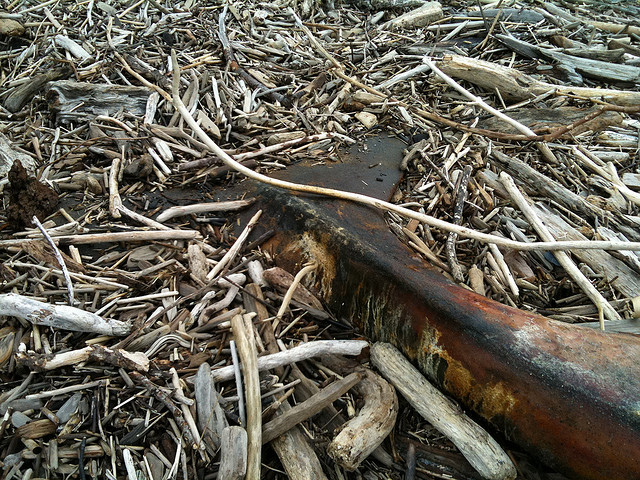“I realized that animals are just like us—they have the same organs as us—and feel the same pain we do,” said Motilal Prasad, the current organizer of the 400-year-old tradition of animal slaughter at Nepalese temples in the name of Hindu goddess, Gadhimai.
That’s not the way they see it just yet in the small community of Faroe Islands.
The locals call it Grindadrap, or more commonly known as the grind, a whaling tradition dating back all the way to 1584 in Faroe Islands. The annual community event is being criticized for killing some 800 pilot whales every year.
It starts with a spotter. Once a spotter sees a group of whales visiting the area, they are systematically driven into a bay and killed by local fishermen, literally filling the sea with bright red blood.
As soon as pictures of these fishermen standing over dead whales in their bloody sea holding their hooks and knives hit the social media, millions of comments flooded our internet with anything from intelligent, calm yet firm approaches to down right murderous criticism against the people in Faroe Islands.
Faroe Islands are an archipelago halfway between Norway and Iceland, some of the most remote areas in the world. Their environment can be quite harsh and agriculture is difficult. As I read hundreds of comments among social media against Faroese people, I cannot help but notice the similarities between these comments surrounding this Nordic community and the media scandal on seal clubbing in northern Canada 10 years ago.
Media and people on social media were very quick to criticize and blame the locals in Northern Canada without empathy or understanding. I realized then that blaming and criticizing was a highly unproductive way to social change.
Instead of approaching it in this way, we need to understand what and who we are dealing with as well as the needs of everyone involved (including us) without judgment or quick blame.
When popular opinion shifts to categorize pilot whales as endangered, it’s important to remember that they are not in fact on the current endangered species lists of many organizations such as NAMMCO (North Atlantic Marine Mammal Commission), the ACS (American Cetacean Society) and IUCN (International Union of Conservation for Nature).
According to IUCN Red List of Threatened Species, there is a record of about 750,000 pilot whales, meaning that the number of whales killed during the Grindadrap represents less than 1% of these whales. Now I’m not saying they should continue to kill whales for their own sport just because the affected number is low. But before we start brutally blaming the locals, we should do our own homework.
Another claim floating around is that of the Faroese relying on whale meat. Though imported foods are more and more available to them, whale meat and blubber have traditionally been an integral part of their diet. That said, there are twice as many sheep as there are people in Faroe Islands so it’s not impossible for them to live without whale meats.
One of the things the local Faroese claim about the grind is the community bond that this event creates. In a recent National Geographic article, the 28-year old interviewee’s states that “these people telling us how to do or not do things” explains the local’s need to protect their way and shows an increased doubt and anger towards the rest of the world.
We fear and criticize what we do not understand. My personal experience (and mistakes) in social activism have taught me that if we were to truly create change, it’s crucial that we understand one another first. It’s really not so much the change we need to create by force, but more about true understanding and connection with other human beings involved that naturally creates change. In this sense, we are the problem and the solution all at the same time.
Every country has these soul debilitating, dark and ugly side of human behaviors criticized by others and Faroe Islands’ pilot whale slaughter is no exception. My birth place, Japan, also has shameful traditions and performs so-called scientific experiments. As a Japanese native, I am no stranger to being the target of some extremely harsh criticism on social media when it comes to environmental issues.
I have experienced everything from finger-pointing at the entire nation as a bad people to the “rationale” that we deserved the tsunami and earthquake we endured in 2011.
No matter which side you’re on, our harmful and violent messages aimed at a certain group of people about their actions and choices create layers and layers of violence that work to indadvertedly cover up the real problem, which makes it impossible for us to see the real solution.
I still do not support the tradition of Grindadrap and I don’t support the Taiji dolphin drive hunt in Japan—but violently criticizing nations or people in these areas is highly unproductive. What we do need is honest, direct, non-aggressive conversations where our sole interest exists in understanding each other rather than blaming.
Then perhaps we can start to witness similar changes like the stopping of mass-slaughter in Nepalese temples more quickly.
“When we judge others, we contribute to violence.” ~ Dr. Marshall Rosenberg
~
References:
~
Relephant Read:
How I Became an Effective Activist.
~
Author: Tomomi Kojima
Editor: Alli Sarazen
Photo: Megan Couglin/Flickr











Read 0 comments and reply